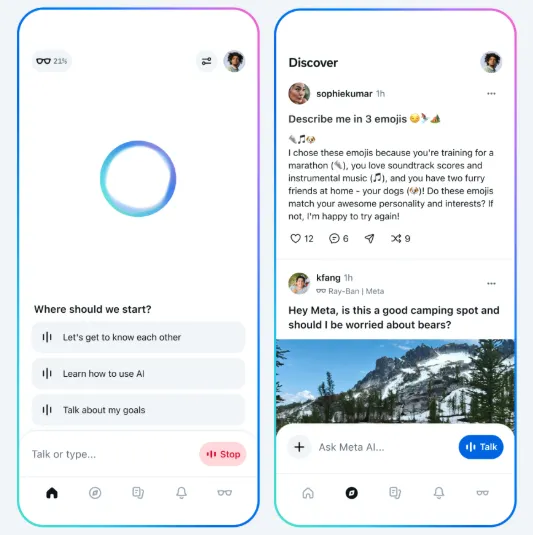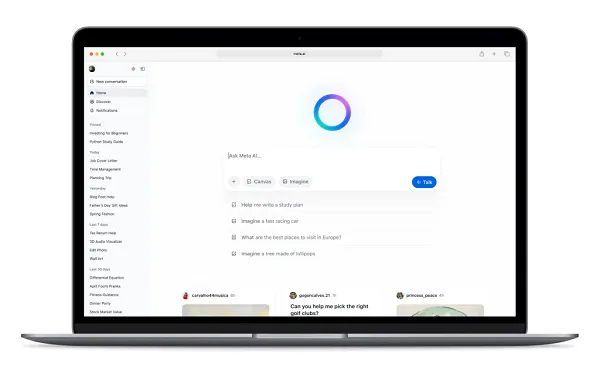Meta has launched a new, separate AI chatbot app, essentially its own version of ChatGPT, which it hopes will help conquer rivals in the AI race.

Meta has recently introduced a revamped version of its app, now named “Meta AI”, which is essentially a rebranded iteration of the former “Meta View”—the companion application for the Ray-Ban Stories smart glasses. This shift signifies Meta’s commitment to integrating artificial intelligence into everyday experiences, offering users a continuous and personalized AI companion while on the move.
According to an official statement from Meta:
“We’re unveiling a new Meta AI app, powered by Llama 4, as the first step toward developing a more personal AI experience. Millions already interact with Meta AI through WhatsApp, Instagram, Facebook, and Messenger. Now, they can enjoy a tailored AI assistant through a standalone app designed specifically for voice-based interactions.”
In essence, the company is rolling out its AI chatbot as an independent app. However, what sets this version apart is its enhanced design for dynamic conversation. Meta emphasizes that this AI will gradually learn from user interactions to deliver more relevant and personalized responses.
“Meta AI is crafted to understand your preferences, making its responses more useful. It’s intuitive to talk to, enabling smoother and more natural exchanges. And it’s socially aware, capable of showing content and updates from the people and communities you care about most.”
There’s some doubt about whether Meta’s latest AI initiative is truly as groundbreaking as the company suggests—especially when you factor in the ongoing concerns about its chatbot’s questionable behavior, including reported instances of it engaging in inappropriate conversations with underage users.
These issues are compounded by wider ethical concerns about AI’s growing influence. With chatbots becoming increasingly persuasive and humanlike, there’s a very real risk that people could begin to form emotional or even dependent relationships with non-human entities. The idea of always-available, deeply personalized AI companions raises serious questions about mental health and social isolation.
Nonetheless, innovation remains the priority. Meta appears committed to outpacing its AI competitors, pushing development forward, and emphasizing the benefits as it pursues dominance in the tech space.
Meta elaborated further:
“We’ve integrated a voice demo using full-duplex speech technology, which can be toggled on or off. This provides a more fluid and lifelike interaction, with the AI generating speech in real time based on conversation, rather than just reading pre-written text.”
While this tech is impressive, one can’t help but wonder if Meta has fully considered the broader consequences. Personalized AI may seem convenient, but are we ignoring the potential psychological toll? As loneliness continues to rise globally, should we really be encouraging deeper bonds with digital entities instead of investing in genuine human connection?
Meta says it’s leveraging its years of experience in personalizing user interactions across its platforms to make Meta AI more tailored to individuals. Users can now instruct the AI to remember personal preferences—like a love for travel or learning new languages. Beyond that, the assistant can gather contextual clues from interactions to offer more precise responses. It also taps into data you’ve already consented to share on Meta apps—such as your profile details and your engagement patterns—to provide more relevant replies.
Alright, fair enough.
Even with the concerns in mind, there’s no denying the practical convenience of an on-demand AI assistant. As Meta continues to expand adoption of its smart glasses, this always-available AI could well serve as a draw for its broader line of hardware products.
Yes, there are upsides. But I still believe that this represents a looming societal challenge—one likely to prompt regulatory intervention after the fact, rather than before the damage is done.
In an effort to make its AI more approachable and educational, Meta is also rolling out a new feature:
“The Meta AI app now includes a Discover feed—a dedicated space to explore and share how people are interacting with the AI. You can browse through top prompts others have created, or customize them to suit your own needs.”
This feed gives users a peek into how others are using Meta AI, potentially sparking ideas or encouraging new use cases.
In addition, Meta is updating the Meta AI website to improve accessibility and enhance the user experience for those who prefer to interact via the web.

The updated web interface for Meta AI has been designed with desktop users in mind, offering a smoother experience on larger screens. One standout enhancement is the improved image generation feature, which now includes a wider selection of presets and customization tools. Users can tweak visual elements like style, lighting, mood, and color to suit their creative needs. Additionally, Meta is piloting a powerful new document editor in select countries. This tool allows users to create multimedia-rich documents—with both text and images—and then export their work as PDFs. They’re also testing the functionality to import existing documents so Meta AI can analyze and interpret them.
Clearly, these features bring some real advantages. There’s no doubt that AI tools hold enormous potential to improve productivity, creativity, and how we handle information day-to-day.
Still, it feels like the intense competition to dominate the AI space might be outpacing our ability to fully grasp the long-term effects. As companies race to outdo one another, we may be moving faster than is wise—especially when it comes to societal, psychological, and ethical implications. This gap between development and understanding could lead to consequences we’re not adequately prepared for.
As of now, Meta’s new AI app is officially live for both iOS and Android users. Voice-based conversations are currently supported in the U.S., Canada, Australia, and New Zealand, while personalized responses are initially limited to users in the U.S. and Canada.


Leave a Reply